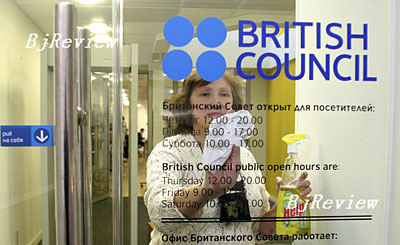|

Less than six months after the diplomatic row between Russia and Britain triggered by the poisoning of former Russian spy Alexander Litvinenko, the two countries were embroiled in another dispute at the beginning of 2008. Russia's closure of two regional offices of the British Council in St. Petersburg and Yekaterinburg plunged the countries' relations to a "freezing point." Why did their diplomatic conflict escalate within just a few months? Apart from domestic political factors, there are a number of underlying reasons.
Rising power
Russia's high-profile emergence has enabled it to be more assertive when dealing with its relations with Britain. In the 1990s when the country was mired in a political and economic crisis, Russia sought to coexist peacefully with Western countries in a humble manner. Although it handled foreign affairs in light of its national interests, more often than not it had to compromise its status as a major power and echo Western views. Given its recovery in recent years, Russia has gained the economic clout to challenge the Western world represented by the United States and Britain.
Russia's recovery is exemplified by its improving macroeconomic landscape and soaring fiscal revenue. Russia joined the ranks of major economic powers as its gross domestic product (GDP) exceeded $1.23 trillion in 2007. Its per-capita GDP is projected to surpass $10,000 by 2015, making it an undisputable world economic power. In sharp contrast to the financial difficulties it suffered in the 1990s, Russia has seen its fiscal surplus grow remarkably in recent years thanks to the increase in its petrodollars. The country's debts as percentage of GDP plummeted from 140 percent in 1998 to some 9 percent in 2007. Its gold and foreign exchange reserves had amounted to $476.4 billion by the end of 2007, an increase of $172.7 billion, or 58.6 percent, from the previous year's $303.7 billion. Russia's gold and foreign exchange reserves currently rank third in the world only after China and Japan. The Russian Government's stabilization fund stood at 2.3 trillion rubles (approximately $86 billion) at the end of 2006, accounting for 8.5 percent of the country's GDP. By the end of 2007, the fund had reached 3.8 trillion rubles (approximately $154 billion), representing an increase of nearly 64 percent.
As its economy revs up, Russia, a country that always celebrates power in diplomatic affairs, has regained confidence. It no longer wants to be a follower of the West but has begun to act independently in defiance through a series of major international actions. Without a doubt, Russia's hard-line stance on the persistent Russia-Britain diplomatic conflict sparked by the poisoning of Litvinenko has much to do with its national rejuvenation.
Litvinenko was a former Russian agent who lived in exile in Britain. He suddenly fell ill in November 2006 and died three weeks later, found to be a rare victim of lethal polonium radiation poisoning. Because he revealed some alleged misdeeds by Russia's Federal Security Service in books he had written, it was widely speculated that the Russian Government was behind his death. In July 2007, Russia declined an official request from Britain for the extradition of former Russian agent Andrei Lugovoi, who Britain believed to be the chief suspect in Litvinenko's poisoning.
Tactical clashes
Russia and the West have long been haunted by deep-seated strategic conflicts. The recent Russia-Britain disputes took place against a complicated background. There is reason to relate them to the chronic war of words between Russia and the United States in the first half of 2007 and their wrangling over the latter's establishment of a missile defense system in Eastern Europe. It may be said that the Russia-Britain conflict is part of Russia's longstanding struggle against Western containment and an inevitable result of the deep-seated strategic clashes between Russia and the West.
| 